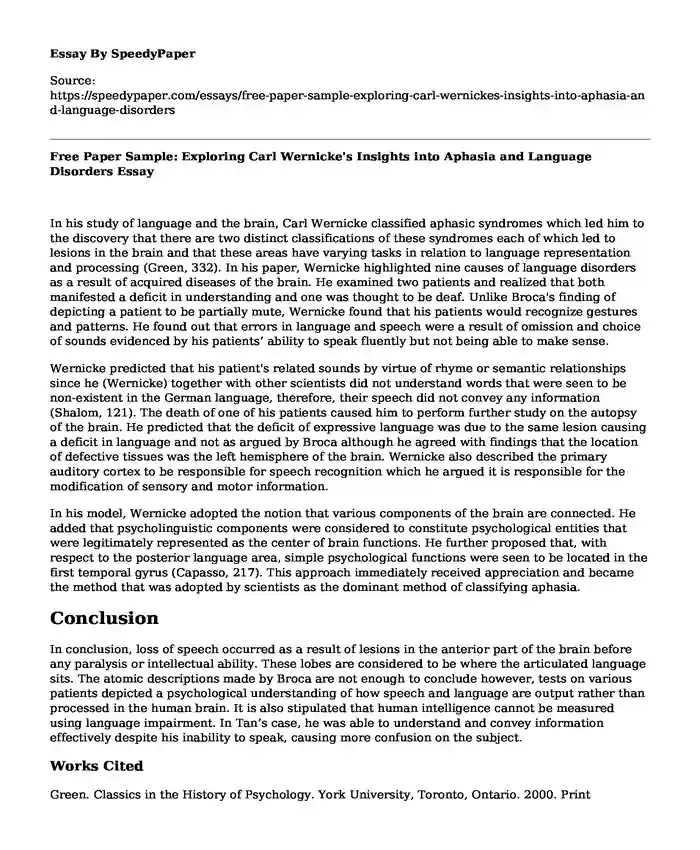
| Type of paper: | Essay |
| Categories: | Psychology Disorder |
| Pages: | 2 |
| Wordcount: | 535 words |
In his study of language and the brain, Carl Wernicke classified aphasic syndromes which led him to the discovery that there are two distinct classifications of these syndromes each of which led to lesions in the brain and that these areas have varying tasks in relation to language representation and processing (Green, 332). In his paper, Wernicke highlighted nine causes of language disorders as a result of acquired diseases of the brain. He examined two patients and realized that both manifested a deficit in understanding and one was thought to be deaf. Unlike Broca's finding of depicting a patient to be partially mute, Wernicke found that his patients would recognize gestures and patterns. He found out that errors in language and speech were a result of omission and choice of sounds evidenced by his patients’ ability to speak fluently but not being able to make sense.
Wernicke predicted that his patient's related sounds by virtue of rhyme or semantic relationships since he (Wernicke) together with other scientists did not understand words that were seen to be non-existent in the German language, therefore, their speech did not convey any information (Shalom, 121). The death of one of his patients caused him to perform further study on the autopsy of the brain. He predicted that the deficit of expressive language was due to the same lesion causing a deficit in language and not as argued by Broca although he agreed with findings that the location of defective tissues was the left hemisphere of the brain. Wernicke also described the primary auditory cortex to be responsible for speech recognition which he argued it is responsible for the modification of sensory and motor information.
In his model, Wernicke adopted the notion that various components of the brain are connected. He added that psycholinguistic components were considered to constitute psychological entities that were legitimately represented as the center of brain functions. He further proposed that, with respect to the posterior language area, simple psychological functions were seen to be located in the first temporal gyrus (Capasso, 217). This approach immediately received appreciation and became the method that was adopted by scientists as the dominant method of classifying aphasia.
Conclusion
In conclusion, loss of speech occurred as a result of lesions in the anterior part of the brain before any paralysis or intellectual ability. These lobes are considered to be where the articulated language sits. The atomic descriptions made by Broca are not enough to conclude however, tests on various patients depicted a psychological understanding of how speech and language are output rather than processed in the human brain. It is also stipulated that human intelligence cannot be measured using language impairment. In Tan’s case, he was able to understand and convey information effectively despite his inability to speak, causing more confusion on the subject.
Works Cited
Green. Classics in the History of Psychology. York University, Toronto, Ontario. 2000. Print
Shalom, Poeppel. Functional anatomic models of language: assembling the pieces. Neuroscientist, 14, 119–127.
Bose, Lieshout. Effects of utterance length on lip kinematics in aphasia. Brain and Language 106, 4–14.
Hickok, Costanzo, Capasso, Miceli. The role of Broca’s area in speech perception: Evidence from aphasia revisited. Brain and Language, 119. (2011) 214–220.
Cite this page
Free Paper Sample: Exploring Carl Wernicke's Insights into Aphasia and Language Disorders. (2023, Nov 05). Retrieved from https://speedypaper.net/essays/free-paper-sample-exploring-carl-wernickes-insights-into-aphasia-and-language-disorders
Request Removal
If you are the original author of this essay and no longer wish to have it published on the SpeedyPaper website, please click below to request its removal:
Popular categories




